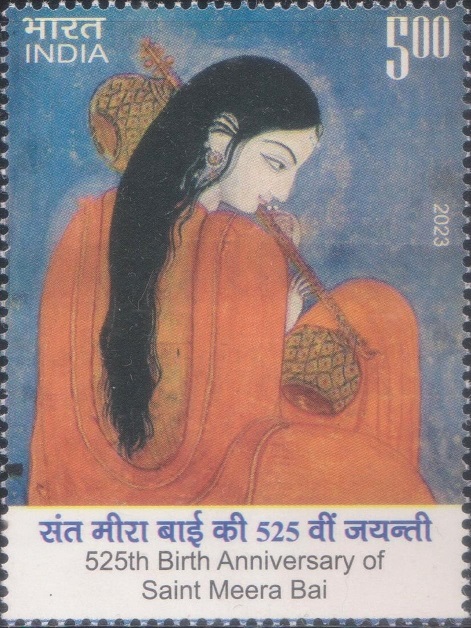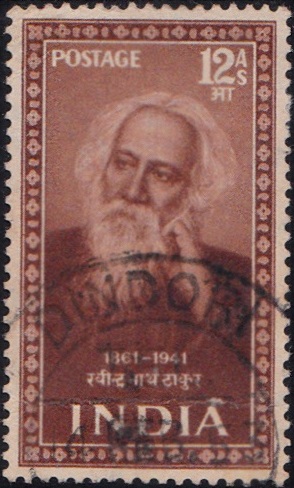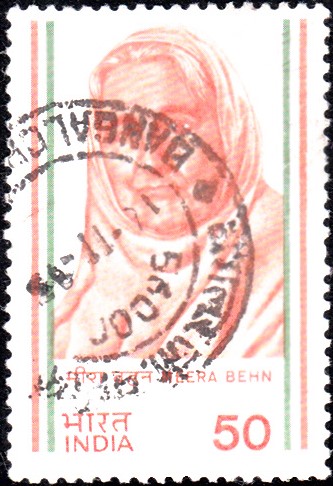
Meera Bai
A commemorative postage stamp on 525th Birth Anniversary of Saint Mirabai, a poet and devotee of Sri Krishna during the Indian Bhakti movement :
 Issued by India
Issued by India
Issued on Nov 23, 2023
Issued for : Department of Posts is delighted to issue Commemorative Postage Stamp on 525th Birth Anniversary of Saint Meera Bai and salutes her teachings to the world on the ways to love God.
Credits :
Stamp/FDC/Brochure : Sh Brahm Prakash
Cancellation Cachet : Sh Brahm Prakash
Type : Stamp, Mint Condition
Colour : Multi Colour
Denomination : 500 Paise
Stamps Printed : 201600
Printing Process : Wet Offset
Printer : Security Printing Press, Hyderabad
Name : Meera
Born on 1498 at Kudaki, Rajasthan, India
Died on 1546 at Dwarka, Gujarat, India
About :
- Meera Bai, born in 1498, Kudaki, India, was a hindu mystic and poet whose lyrical songs of devotion to the god Krishna are popular in northern India.
- Meera Bai was a Rajput princess, the only child of Ratan Singh, younger brother of the ruler of Merta. Her royal education included music and religion as well as instruction in politics and government. An image of Krishna given to her during childhood by a holy man began a lifetime of devotion to Krishna, whom she worshipped as her Divine Lover.
- Meera Bai was married in 1516 to Bhoj Raj, crown prince of Mewar. Her husband died in 1521, probably of battle wounds, and thereafter she was the victim of much persecution and intrigue at the hands of her brother-in-law when he ascended the throne, and by his successor, Vikram Singh. Meera Bai was something of a rebel, and her religious pursuits did not fit the established pattern for a Rajput princess and widow. She spent most of her days in her private temple dedicated to Krishna, receiving sadhus (holy men) and pilgrims from throughout India and composing songs of devotion. At least two attempts made on her life are alluded to in her poems. Once a poisonous snake was sent to her in a basket of flowers, but when she opened it, she found an image of Krishna. On another occasion she was given a cup of poison but drank it without any harm.
- Finally, Meera Bai left Mewar and returned to Merta, but finding that her unconventional behaviour was not acceptable there either, she set out on a series of pilgrimages, eventually settling in Dwarka. In 1546 Udai Singh, who had succeeded Vikram Singh as rana, sent a delegation of Brahmans to bring her back to Mewar. Reluctant, she asked permission to spend the night at the temple of Ranchorji (Krishna) and the next morning was found to have disappeared. According to popular belief, she miraculously merged with the image of Ranchorji, but whether she actually died that night or slipped away to spend the rest of her years wandering in disguise is not known.
- Meera Bai belonged to a strong tradition of bhakti (devotional) poets in medieval India who expressed their love of God through the analogy of human relations — a mother’s love for her child, a friend for a friend, or a woman for her beloved. The immense popularity and charm of her lyrics lies in their use of everyday images and in the sweetness of emotions easily understood by the people of India.
- Meera’s mystic songs act as a soothing balm to the wounded hearts and tired nerves of those who toil in this world with the heavy burden of life. The sweet music of her songs exerts a benign influence on the hearers, removes discord and disharmony, and lulls them to sleep. Meera’s language of love is so powerful that even a downright atheist will be moved by her devotional songs. Meera’s songs infuse faith, courage, devotion and love of God in the minds of the readers. They inspire the aspirants to take to the path of devotion and they produce in them a marvellous thrill and a melting of the heart.
- Text : Referenced from content provided by Proponent.
Subscribe
Login
0 Comments
Oldest







